Gansa is no more – back to Xining and onto one of those bizarre 15 hour bus rides that become like their own little worlds. Bunk beds and cell phones everywhere and a populace of forty-five or so that either gets to know one another or tries very hard not getting to know one another.
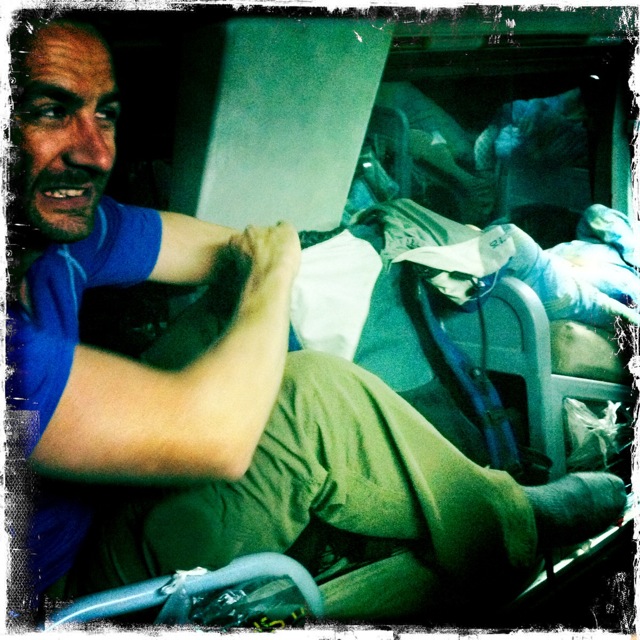
Michael ponders his new living quarters for the next 15 hours – a bunk that is 30 centimetres too short for a full stretch and a mere sliver wide with only a small bar preventing a two metre plunge onto the floor
Our destination is Zado (not Dzado nor Zadoi but rather a smaller town off of the main route) – continuing our great southern plunge – but our bus direction is towards the Khampa stronghold (within Qinghai) and ancient market town of Yushu. Also known as Jyekundo it remains true to its Khampa (eastern Kham region) routes in populace, appearance and passion.
We ease stiff bones off the bus just as cold light attempts to stir the day. We exit at Qingshuihe (Danda to locals). Wrapped bodies stir, crooked dogs stretch out their thin frames (as we are doing) and the cold seems to be in everything.
Two hours later we step out of a small van and into the cold downtown of Zado. Rain, which would become snow in only a couple of degrees less, falls in uneven sprays of mist.
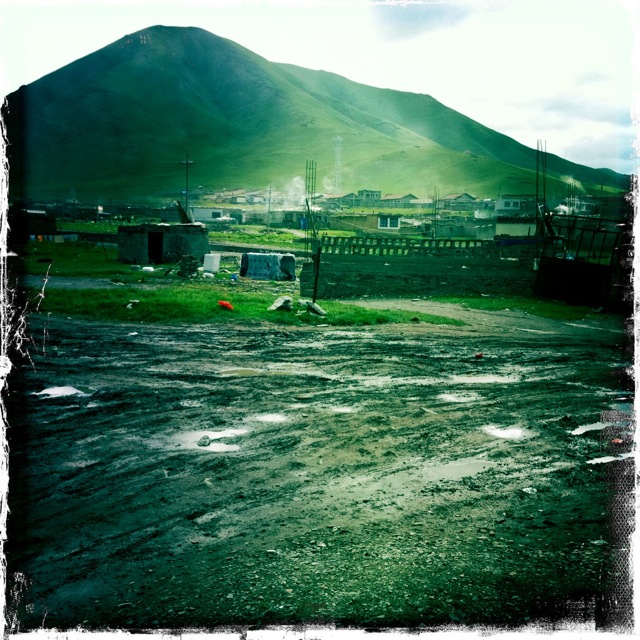
Wet and muddy Zado welcomes us to a barren bit of civilization set amidst highlands and nomadic valleys
It is amazing what the sky’s moods can do to a landscape. The rolling hills are green, but an overcast sky gives the entire area a grey filtered coat. Though technically still in Qinghai, the bodies here are bigger boned, wider and there is that little bit of recklessness in the eyes that remind me of Kham which rests below and to the southeast. It is comforting in the way that the more tangible elements in life are – I’ve always found it easier to trust that which is seen, which is felt regardless of intensions.

Nomads are never far and their duties never finished. Here a nomadic woman collects yak dung for fuel as trees are absent above four kilometres in the sky in these parts
Our host family lives in a muddy field in a walled-in compound tucked away behind mortar. The requisite Tibetan mastiff is tethered by a chain that could haul an automobile and the ‘main man’ himself is built in similar proportions to the mastiff. He wears the ‘alun’ – a long silk length of immaculate black tied into his long hair, wrapping his locks into a weave on his head – that is often favoured by the Khampas of eastern Tibet. It is worth describing him because of his absolute audacious charisma in this little idle town. Fastidious, wide, with a head and neck that threatened the seams of his shirt, he is a series of parts that didn’t seem to belong together – such is charisma. Immaculate, brutish, eloquent, direct, powerful and self deprecating – all of this was visible to Michael and I within minutes. On his meaty face there is a delicate moustache breaking up his block like head and civilizing him (or ‘villainizing’), but it is obviously a thing of pride as he often lifts his huge paw and pats the few whiskers down softly. With all that he displays, there is still the sense that he is holding back so much more – he is magnificent. It is such characters that gave a day a little lift and a bit of colour.
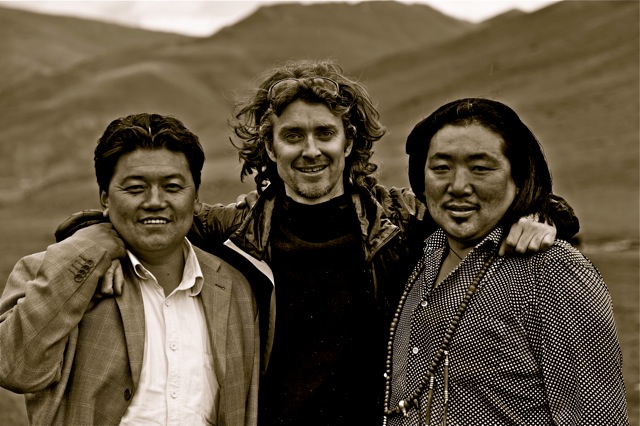
Two new friends – of the three of us, Tupten ‘the bull’ (right) is most crucial to the tale. He was never without a little munchie tucked away somewhere and his flare for life will remain with me for sometime
The town of Zado itself seems at first glance miserable but all around us there are pockets of noise and life and of course the nomads which can legitimate a place for me instantly. Their splashes of colour, the fierce but warm faces and their guttural clicks and clucks as they communicate…and their signature motorbikes which seem capable of carrying the weight of the world.
Michael and I track down a dumpling shop, which always seem to fill our ever present voids of hunger. It is here, that we often communicate and strategize our next steps. It is where our observations, our highs…our questions are randomly released. All comes out over dumplings.
I am always curious in these towns with so many huddles of men sitting around, at what all of these people do. For the Tibetans much of their life is seasonal, making their fungus profits in the spring and moving their herds of muscular yak in accordance with the sky. Making the rounds with our massive host of the moustache we are treated to curiosity, reckless and completely free smiles and the odd little body peering around from their mother’s woolen layers.
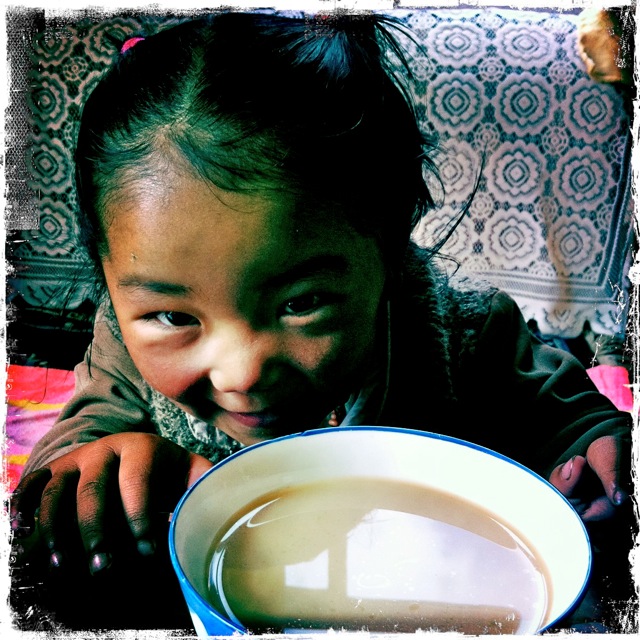
One of the figures which marks my travels. I swung between calling her ‘the cherub’ and ‘the little goddess’…regardless of ether title she swilled butter tea down in amounts that stunned
One of the extended family that we are staying with (though not sure who) has a little girl who has one of the most beautiful faces I’ve ever seen. Plump, broad and already showing signs of being indestructible, she has both innocence and cleverness in her eyes. Watching her down bowl after bowl of butter tea I marvel at her…she is utterly fearless. Her face is dark and Asian but there is something universally familiar about her, almost divine – a rolly-polly little goddess.
We come to a nomadic series of valleys outside of town, passing rusted out abominations of gold mining equipment – left to rot in the middle of a river. The valleys are pathways leading to other pathways bending, reaching ever higher -everywhere are yak.
Our host, Tupten, strokes his moustache a few times before introducing us to a household. The woman of the house – and there are always women of the house – is thickset with shoulders like a bull, and opens her home and life up to us without second of hesitation.
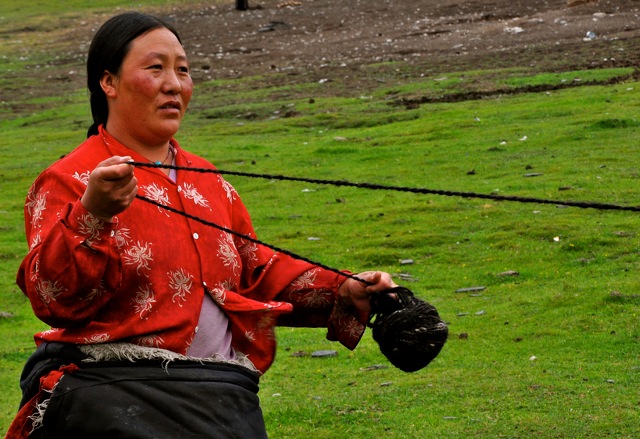
One of our many hostesses – here she assists in ‘spinning’ yak wool making it pliant enough to use for ropes, tethers or any number of needs around the homestead
Kids gather with unkempt hair, dirty fingernails and gorgeous smiles. Carefree with scars already adorning their faces, this is the next generation of nomads. They do effortless handstands and have the kind of innate athleticism that comes with fearlessness and understanding.
Tupten proves as adept with the nomads as he is with us. There is no pompousness and no treating anyone as beneath him. He effortlessly imparts joy.
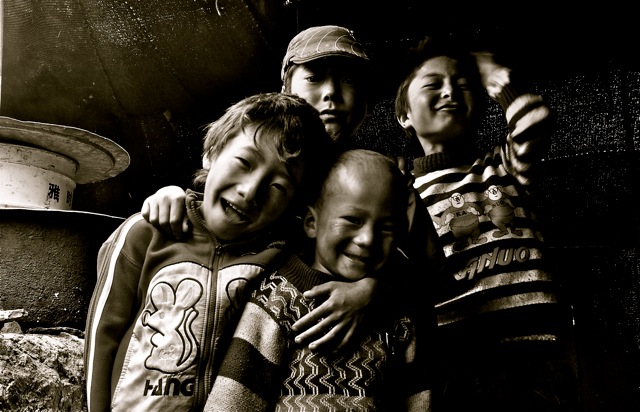
A gang of nomadic boys shows up for some fun – for a life of toil on the land there are many moments of pure collective joy to be had
As always the combination of elements rubbing against us, and real time life being lived brings a sense of comfort. We ease further into the deep valley’s belly as cold clouds form and rumble.
Rain comes as we sit within a nomadic tent with a family, taking back bowls of tea. Tupten laughs at something our host has said and the feeling that all is well, with a fire, friends and some tea is strong.
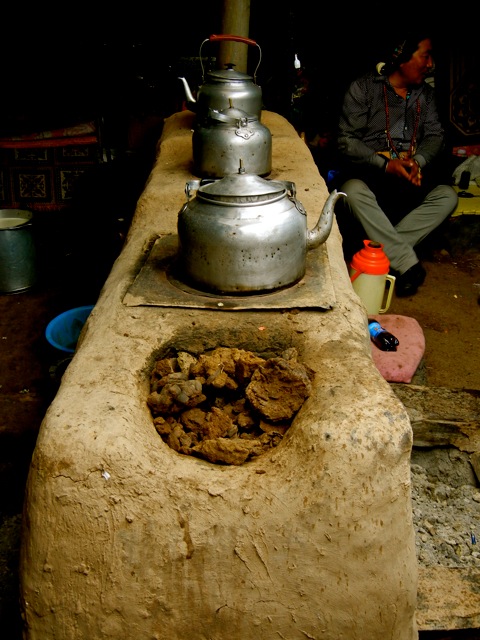
One of the brilliant ‘musts’ within nomadic tents – a clay hand-fashioned stoves – with multiple openings for cooking multiple items at once, though here the emphasis is on kettles for tea
There is a discussion being had about school – our host adamant that going away to school to get an education is vital, while the son has the expression of someone who is quite content to remain at home. The lives of nomads, while humbling in the physicality of their environment seem in many ways wise. Once the elements are dealt with (and one learns to survive them), the days pass by for many with good unprocessed food – yak milk and yoghurt are laden with amino acids, minerals and vitamin A – and people who you know absolutely and who are close. I remember a nomad from the Niarong (Hsinlong) portion of western Sichuan once telling me, “if one survives past 12 years old, one will live a life of sun and movement”.
Poverty here takes on different proportions and appearances. Nomads often pity the city dwellers who live in shacks, eat nothing and cannot breath air…
Outside of our warm tent, the rain changes tune and direction…but doesn’t cease.

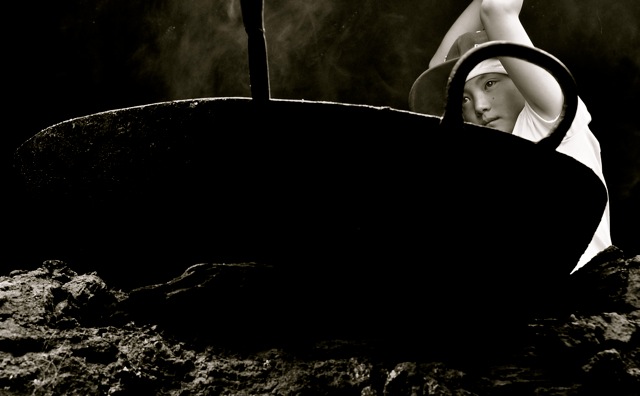
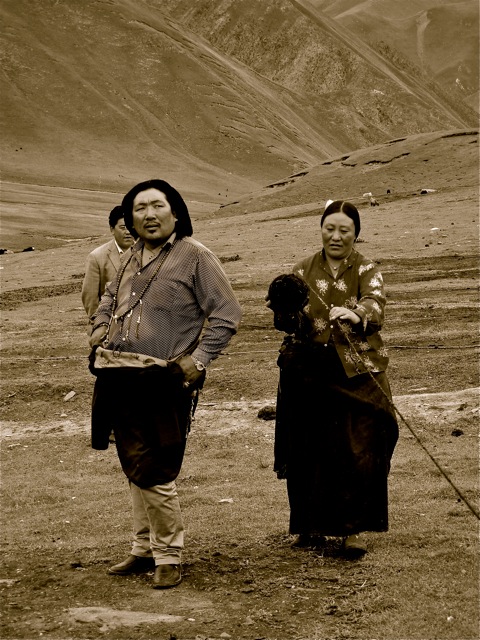
In reading your tales of nomads, Jeff, I frequently wonder how their lives have changed over the past generation or so. And what have those changes meant to their outlook on life and their relationships with each other and the rest of the world. Perhaps could you elaborate on this in a future post.
And yes, the cherub is a real “cutie”, mature (wise?) beyond her few years, I suspect. Look out world!
Best wishes,
Peter
Peter, will be heading back into the nomadic lands shortly and will certainly post on the changes; changes that are inevitable, brisk and definitive.
Jeff